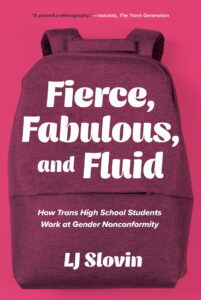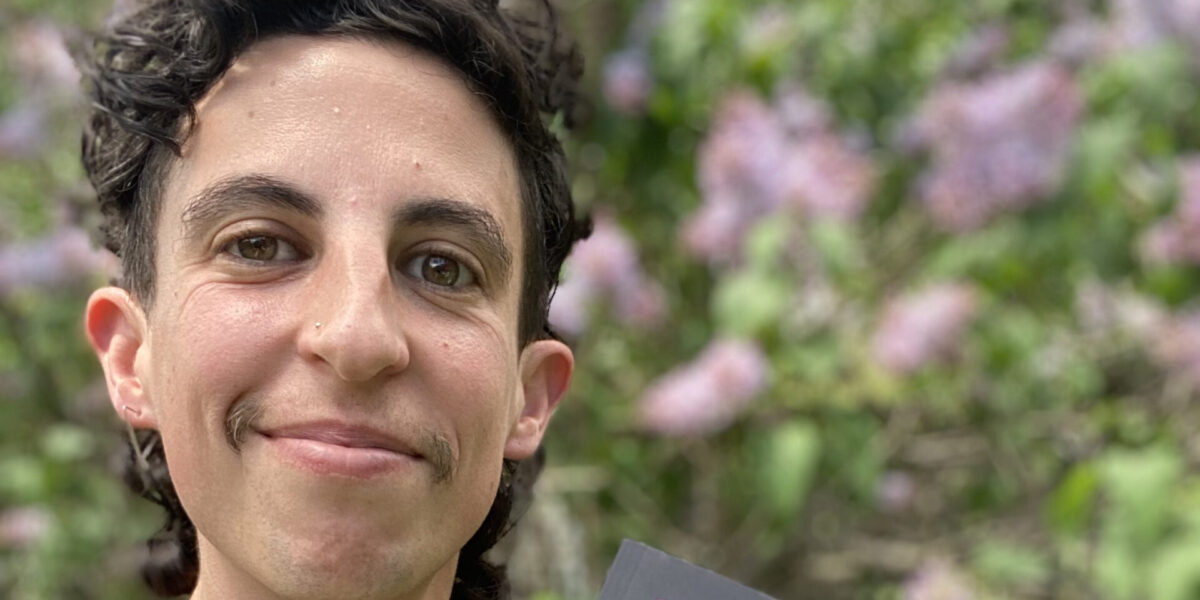Being trans is “such a beautiful way to exist in the world,” LJ Slovin told me via videoconference. Why, then, are so many people and institutions obsessed with the risks that come with existing as trans in a transphobic world? And what are the alternatives?
In their new book, Fierce, Fabulous, and Fluid, the University of Toronto post-doctoral fellow tackles these questions head-on through a combination of ethnographic study, theoretical critique, and queer intuition.
Got risk?
Slovin, who is nonbinary themselves, holds a PhD in Curriculum and Pedagogy from the University of British Columbia. Fierce, Fabulous, and Fluid is a revision of their doctoral dissertation, and the fruit of a year spent amongst trans and gender-nonconforming students at a British Columbia Lower Mainland high school.
Near the beginning of the book, Slovin tells readers the story of the first time they visited the school. They were there to meet with a vice principal about their research project. “He was welcoming and almost relieved to hear about my study,” Slovin recalls. “He informed me that [the high school] was committed to creating a safe space for its trans students and then confessed that they were overwhelmed and confused by how best to support specifically nonbinary youth…The vice principal positioned my nonnormative body as representing the solution to his concern about gender-nonconforming youth” (p. 19).

The vice principal’s ‘relief’ reflects the grip that the accommodation-based approach to trans and nonbinary inclusion has on well-meaning Canadian schools and educators. The naive belief that if we can just run one more workshop on trans and nonbinary inclusion, Canada’s schools will become gender utopias.
It’s a “nice approach,” Slovin said. “It does not cause conflict.” When a parent comes into the school to complain about their child using they/them pronouns, a response rooted in accommodation says that, of course the school is going to let the child do so, because it is a ‘safe space’ with ‘zero tolerance’ for discrimination.
But accommodation is an approach that is rooted in fear and the belief, as Slovin put it that “being trans makes a young person vulnerable instead of it being our transphobic cis-heteronormative society that is creating obstacles for young people”. The approach is obsessed with the risks that are supposedly inherent to being a trans or nonbinary youth, and attempts to ameliorate those risks through acts of inclusion.
This framing “focuses on hardship. It focuses on struggle,” Slovin reflects. And it positions well-meaning adults as the protectors of trans and non-binary youth, almost as if these youth need to be protected from themselves.
A “much stronger response” is for educators to respond to transphobic “concern” by saying that, yes, students can be who they want to be because “we want our students to be trans, if they are.” But that response is less polite. It causes conflict.
It’s the difference between a risk-based framing of trans inclusion and a desire-based one.
From risk to desire
At its root, Fierce, Fabulous, and Fluid is a manifesto for Canadian educators and educational institutions to celebrate trans and nonbinary identities as valuable and worthwhile ways to exist in the world.
The book centres the voices of the trans and nonbinary students who feature in Slovin’s study. And that, in and of itself, is a radical intervention into how Canadians think about young people. “We position young people in our society as if they are not actually capable of articulating their own lives, their own genders, their own needs and desires,” Slovin tells me. But that is simply not true.
The trans and nonbinary students Slovin spent a year with have done substantial labour in order to create spaces for themselves in which they can articulate and live into who they are. These acts of worldmaking go largely unnoticed, even by the well-meaning adults in the educational system.
And, so, putting the epistemological shift from a risk-based framing of gender-nonconformity to a desire-based one starts with “paying attention to the type of work young people are doing in schools” and shifting “some of that labour into an adult responsibility.”
“Are we giving spaces to young people that aren’t just” Gay-Straight Alliances, but “spaces that they can build in the way that we need?,” Slovin asked me. Are we disciplining students who leave school spaces that do not properly value their gender identities, or are we “noticing that that means something isn’t working and that, actually, we could value their input and experience?” Finally, do educators “think that it is necessary to know their students’ gender in order to teach them, in order to care for them, and in order to support them?”
Gendered labour will always feature in Canada’s educational institutions, but there are ways that that labour can fall more heavily on the adults who are paid to be there instead of on the youth who are forced to be. That means incorporating materials that centre queer experiences throughout the curriculum. It means teachers modeling pronoun usage and pronoun fluidity (“my pronouns are she/her today, but I will let you know if that changes”). And it means rejecting the idea that young people are essentially ignorant of who they are.
As one of the youth whose life Slovin’s study tracked said, adults often fear that trans and nonbinary youth will grow out of their gender-nonconformity. That it will be “just another phase.” But if it is a phase, this youth asks, “what is the big deal?”
As Slovin put it to me, “young people are the experts in their lives, and I think our role” as adults “should be to support them in providing what is necessary to feel confident in articulating themselves, confident in learning about who they are, confident in accessing role models and resources and information that help them be themselves.”
Fierce, Fabulous, and Fluid is a must-read book. Its release could not be more timely. With Alberta gearing up to restrict the rights (in schools and elsewhere) of trans and nonbinary youth under the guise of well-meaning concern, and with Saskatchewan and New Brunswick having already enacted rules targeting trans and nonbinary students, Fierce, Fabulous, and Fluid equips its readers with a much-needed framework for combatting anti-queer educational policies.
Slovin’s book is an urgent call to listen to trans and nonbinary youth themselves and to centre their stories and perspectives. Pick up a copy for yourself: Read it and be inspired.



